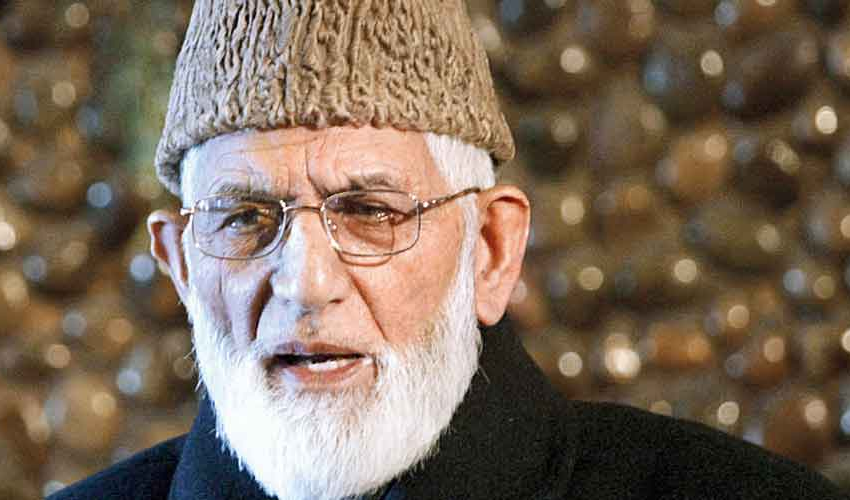
Remembering Syed Ali Shah Gillani: A Tribute to the great Kashmiri Pro-Pakistan Leader

On this solemn day, we commemorate the death anniversary of a towering figure in the Kashmiri political landscape, Syed Ali Shah Gilani. A man who dedicated his life to advocating for the rights and aspirations of the Kashmiri people.
Born on September 29, 1929, in Zoorimunz village of North Kashmir’s Bandipora district, Geelani’s journey into politics began early. His family background and upbringing played a significant role in shaping his political views. He was deeply influenced by his father, who was associated with the religious and political movements of the time. This early exposure to activism laid the foundation for Gillani’s lifelong commitment to the Kashmiri cause.
His political activity began during the tumultuous period of the 1947 Partition, when the princely state of Jammu and Kashmir became a focal point of contention between India and Pakistan. As a young man, Geelani participated in the political movements that aimed to secure the rights and autonomy of the people of Jammu and Kashmir.
Gillani’s political journey started from the platform of Jammat-e-Islami in 1952 and he soon rose to become district chief of Kupwara and Barmula district. He believed that the region’s fate should be determined through a free and fair plebiscite, in line with the United Nations Security Council resolutions. Throughout his life, he consistently argued that the aspirations of the Kashmiri people should be the guiding force in determining their political future. He struggled for his cause in the mainstream politics, but he soon realized that the Indian government had never been sincere in the resolution of Kashmir issue.
Because of his political ideas he spent more than 12 years of his life in jail, he was first arrested in 1962 on the charges of “raising the Kashmir issue”. He staunchly opposed the enactment of Indian draconian law of Public safety Act (PSA) and he openly challenged the Chief Minister Sheikh Mohammad Abdullah, when he introduced the Public Safety Act in the region.
Syed Ali Shah Gillani played an active role in formulation of Muslim United Front (MUF) in 1987 –ahead of a provincial election – where all Muslim parties came under single platform against pro-India parties, including National Conference. This time he was jailed again by the Indian government along with three other winners. These event became a watershed moment, when marked with the beginning with an indigenous armed resistance against Indian unlawful occupation of Indian Occupied Jammu and Kashmir.
In 1992 foundation of All Parties Hurriyat Freedom Conference (APHC) was laid, which was a platform of at least 30 pro-freedom parties to take forward Kashmiri people’s fight for self-determination. In August 2004 Gillani along with Muhammad Ashraf Sehrai launched Tehreek-e-Hurriyat ( Movement of Freedom) and in 2009 he launched the “demilitarization movement” and in 2010 when three civilians were killed in a fake encounter along the LoC a mass uprising triggered, he was in the forefront.
In 2016 after the killing of the young freedom fighter Burhan Wani by the Indian security forces, Gillani along with Mirwaiz Umar Farooq and Muhammad Yasin Malik organized protest against the brutal action of the Indian occupation forces.
After the Indian government revoked Article 370 and 35 A from the Constitution, scrapping the county’s only Muslim majority state with its autonomy, he remained consistent with the struggle prior the revocation of special status.
Syed Ali Shah Gillani remained house arrested after 5 August 2019 till his death. He was a resolute leader who fearlessly spoke up for the rights of the Kashmiri people and their right to determine their own future.
Syed Ali Shah Gillani’s life was a testament to his unwavering commitment to the Kashmiri cause and his passionate belief in the right to self-determination. His legacy will continue to shape the discourse surrounding Kashmir’s future. As we remember him on his death anniversary, let us also hope that his passing serves as a catalyst for renewed efforts towards peace, stability, and justice in the beautiful and troubled region of Jammu and Kashmir. Because Indian Occupied Jammu and Kashmir cannot find freedom and peace while witnessing extrajudicial murders, continual killings of youth, rape Kashmiri women and arrest and torturing of political figures and pro-freedom activists by the Indian forces. That is why with the help of the international community the Kashmiri people has to carry on the fight until openly give right to them to decide their own political future.
By Endre Barcs
